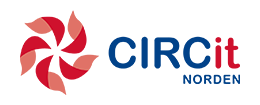
A number of companies from the Nordic countries are already making headway in a circular economy, and more companies are invited to jump on the circular economy journey. They will be well-equipped for a future in which value creation will be decoupled from the consumption of finite resources, leading to enhanced competitiveness and growth.
The potential gains from conducting business in a circular manner can be considerable. A report compiled by the Ellen MacArthur Foundation and McKinsey indicates that the annual potential of a circular economy in Europe is estimated to be €1.8 trillion a year already by 2030. Furthermore, the European Commission has adopted ambitious objectives in order to assist European companies and consumers in transitioning to a circular economy where resources are utilised in a more effective way.
– Circular economy requires a company to rethink how it understands and conducts business – the hard part is knowing where to begin. The good news is that the earlier companies start thinking anew – whether in terms of a product, an entire business model or closing material flows – the greater their chances will be to gain market shares and surpass their competitors, says Tim C. McAloone, Project Manager for the CIRCit project, which provides with scientific support and develops tools and methods to support Nordic companies in their transition towards circularity.
One such fore-runner is Norwegian company Ope, which manufactures modular furniture that can be adapted throughout its life.
– Our furniture has the potential to last a very long time, as parts can easily be replaced, and it can be reconfigured to suit new situations. The next step for us is to explore how we can support our products with services that further extend their longevity, and that enable closing material loops at the product’s end-of-life. Also, we are looking to innovate in the area of materials, so that we can produce furniture without using virgin materials. Eventually, we aim to become a fully circular business, as we believe this is in the long term interest of our business, as well as the environment. We have therefore joined the CIRCit project to plan our next steps on our circular economy journey.
Swedish company Seco Tools has been accepted as a tier 1 company in the CIRCit project. Seco Tools is one of the world’s largest providers of metal cutting solutions for milling, stationary tools, holemaking and tooling systems.
– We want to take a holistic approach towards sustainability and establish a Life Cycle perspective. This will help us take a look at new ways of working with circular resources in our organization.
The Swedish company 3TEMP/PLAE2TECH develop, manufacture and marketing high-end quality coffee machines for the professional market.
– Being a part of CIRCit has given us the knowledge that “the details create the big picture” and after our first workshops with CIRCit, we could at once commercialise one brand new business model connected to circular economy that will enhance our total business. We truly appreciate that, says Andreas Slätt, CMO/Brand Manager at 3TEMP/PLAE2TECH.
Companies seeking support in defining or refining their approach to circular economy, can join the CIRCit project. The participating companies will, in close cooperation with CIRCit researchers and with scientific rigour, determine the overall potential of implementing a circular economy for their business, and will formulate new or improved circular business models, offerings and solutions. CIRCit is making the knowledge currently available on circular economy accessible through practical tools and methods for companies to use, and is improving and advancing these through working with the companies.
– One of the greatest challenges faced by companies’ today concerns how we should work with future competitiveness and growth while also strengthening resource and energy productivity. Joining the CIRCit project is a great opportunity and we are very pleased that the companies who have joined so far are ready to explore the opportunities brought by circular economy, and hopefully more companies will also realise this and implement circular practices, says McAloone.
It is not too late to join the circular economy journey, during 2018 and 2019, the project will continue to recruit companies, approximately 50 companies will be invited to a next wave of close cooperation and more than 200 companies will be invited to workshops and webinars in Norway, Sweden, Denmark, Iceland and Finland to learn more about how to make use of the project’s results – such as tools and publications.
Participating companies in tier 1:
Danelec, Konecranes, Ope, Össur, Seco Tools, 3TEMP/PLAE2TECH. The companies Marel and Lillelam are also partners in the CIRCit project, being engaged in a variety of focus areas.
The research project Circular Economy Integration in the Nordic Industry for Enhanced Sustainability and Competitiveness (CIRCit) is being spearheaded by the Technical University of Denmark (DTU) and funded by the Green Growth Initiative (NordForsk, Nordic Energy Research and Nordic Innovation) and will run over from 2017 to 2020. Other project participants include RISE IVF, part of RISE Research Institutes of Sweden (former Swerea IVF), the Norwegian University of Science and Technology (NTNU), Innovation Center Island and Technology Industries of Finland.
